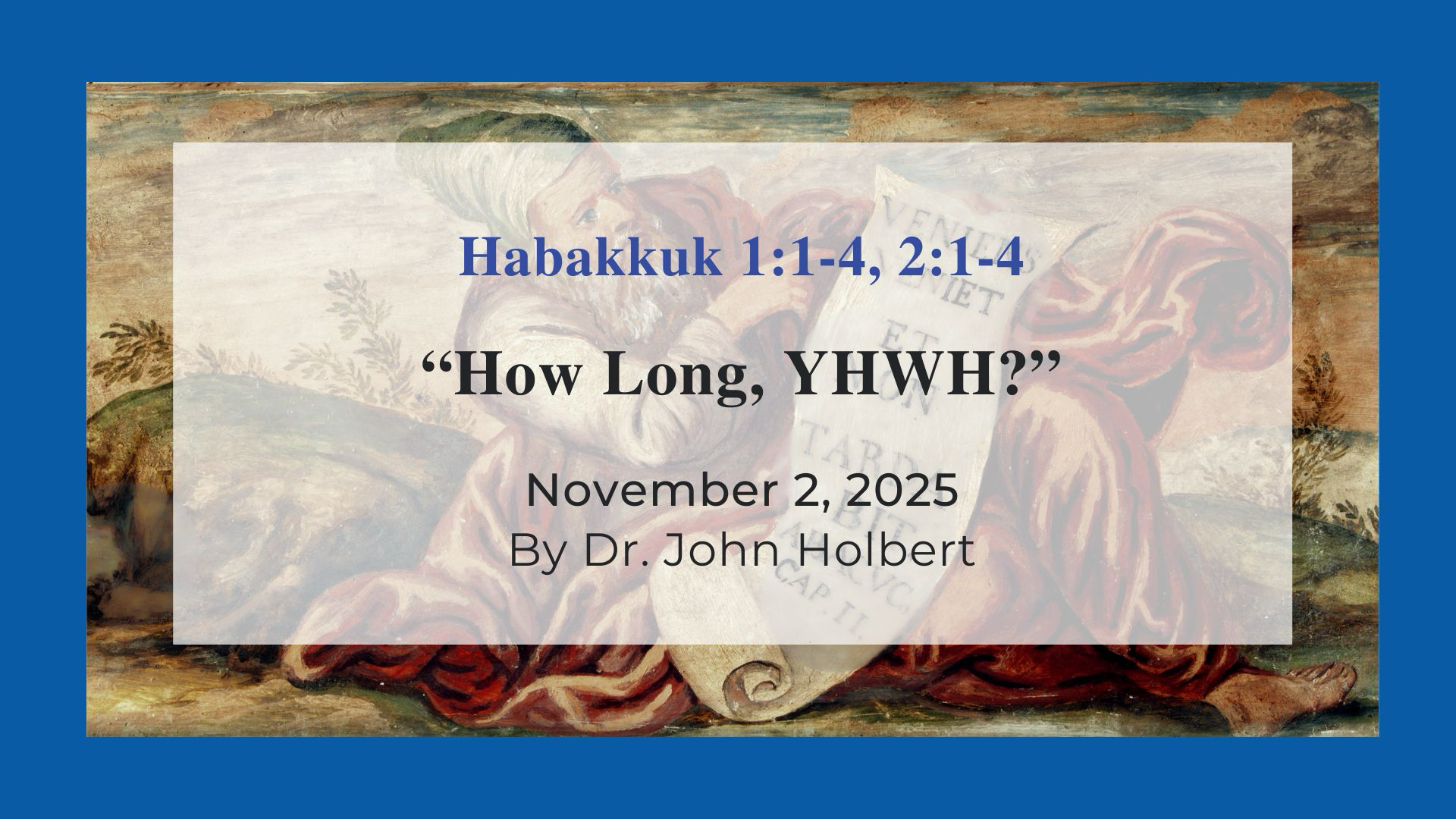How Long, YHWH? Reflections on Habakkuk 1:1-4, 2:1-4. Pentecost 21, Year C
by John C. Holbert on Wednesday, June 25, 2025

I imagine that the tiny book of Habakkuk is not even in the top ten of favorite Bible compositions, but I wish to suggest that perhaps it should be. There is a deep and honest conviction in the language of this prophet that gives permission for any believer to ask the very hardest questions of their God. Habakkuk makes it plain that the God we worship is anxious for truth from God’s people, and is uncomfortable with those who present themselves clothed in false piety, those who utter words in God’s presence that are less than fully truthful. God is in reality rather like a careful therapist, who listens with skill and empathy, but who can make no headway with anyone who refuses to come fully clean about the life they lead and the pains that life has presented.
Unfortunately, we know precisely nothing about this prophet, neither his historical context, nor his personal life. Unlike other prophets of the Hebrew Bible, the oracles of Habakkuk float in a contextual void, thus driving us to listen with special care to what the prophet actually says. And what this prophet says may sound in our ears just like things we have said, or if we have not said them out loud, we have thought them in our troubled hearts, but have been too fearful to speak them into the air.
“How long, YHWH, must I cry out, but you will not listen?
I shout, ‘Violence,’ but you will not save!
Why do you force me to witness evil,
to perceive trouble?
Annihilating violence comes close;
contentious strife rises.
Therefore Torah is loose;
justice never wins,
Because the wicked surround the righteous,
justice comes out perverted.”
Habakkuk with searing language raises the age-old issue of theodicy: if God is so good, then why is the world so filled with evil? And further, why must I be the one to witness this travesty of the lack of divine actions in the world? If God is powerful, then why do “the wicked surround the righteous” so that “justice is perverted?” Note that Habakkuk uses the fateful word “violence” (chamas) twice, first as a signal that YHWH is expected to respond to with overwhelming authority to the outcry of the oppressed, and second, as representing the horror of a life that receives nothing from God but pain, here named “annihilating violence.” Habakkuk echoes Job 19:7 where the famous sufferer says, “Even when I cry out, ‘Violence,’ I am not answered.” It is YHWH’s job to respond to the cries of the people who are oppressed and violated, but both Job and Habakkuk hear nothing from God at all.
How does Habakkuk deal with this silence from YHWH in the face of his cries for response to the world’s continual wickedness and pain? The reply is unusual, yet important. The essence of it appears to be that the prophet is ever watchful for that response from God, no matter how long it may take.
“I will stand at my post,
place myself on the rampart
to see what God will say to me,
what God will answer concerning my complaint.
Then YHWH answered,
‘Write the vision,
make it clear on tablets
in order that a runner can read it.’
For there is still a vision for the time;
it speaks of the end
and does not lie.
If it tarrys; wait for it;
it will come surely, without delay!”
The prophet is beyond convinced that the silence of YHWH will end. It will be shattered by a “vision,” and Habakkuk must write that vision down so plainly that even a runner rushing by will be able to read it! It may seem to be delayed, but it will come. Of that, the prophet is more than certain. He then adds the most famous line in the book, a line repeated through the ages by subsequent prophets: “the righteous live by their faithfulness” (Hab.2:4c). That is, the world may appear to be falling into disaster, either brought on directly by YHWH, or merely by the random acts of evil done by humans; either way, those who are righteous will remain at their posts, anticipating and expecting answers from YHWH, who will not fail to reply to the cries of the oppressed.
Habakkuk makes this central claim vivid with an unforgettable metaphor at the end of his book. Trust in YHWH must be maintained even when such trust appears absurd.
“Though the fig tree does not blossom,
and no fruit is on the vines;
though the olive oil fails,
the fields produce nothing;
though the flock is cut off from the fold,
no herd in the stall,
still I will rejoice in YHWH;
I will exult in my saving God.” (Hab.3:17-18)
You can easily see just why this prophet needs to be better known and appreciated. His trust and hope in YHWH is little short of thrilling! We have much we can learn from such unbounded trust in God.
